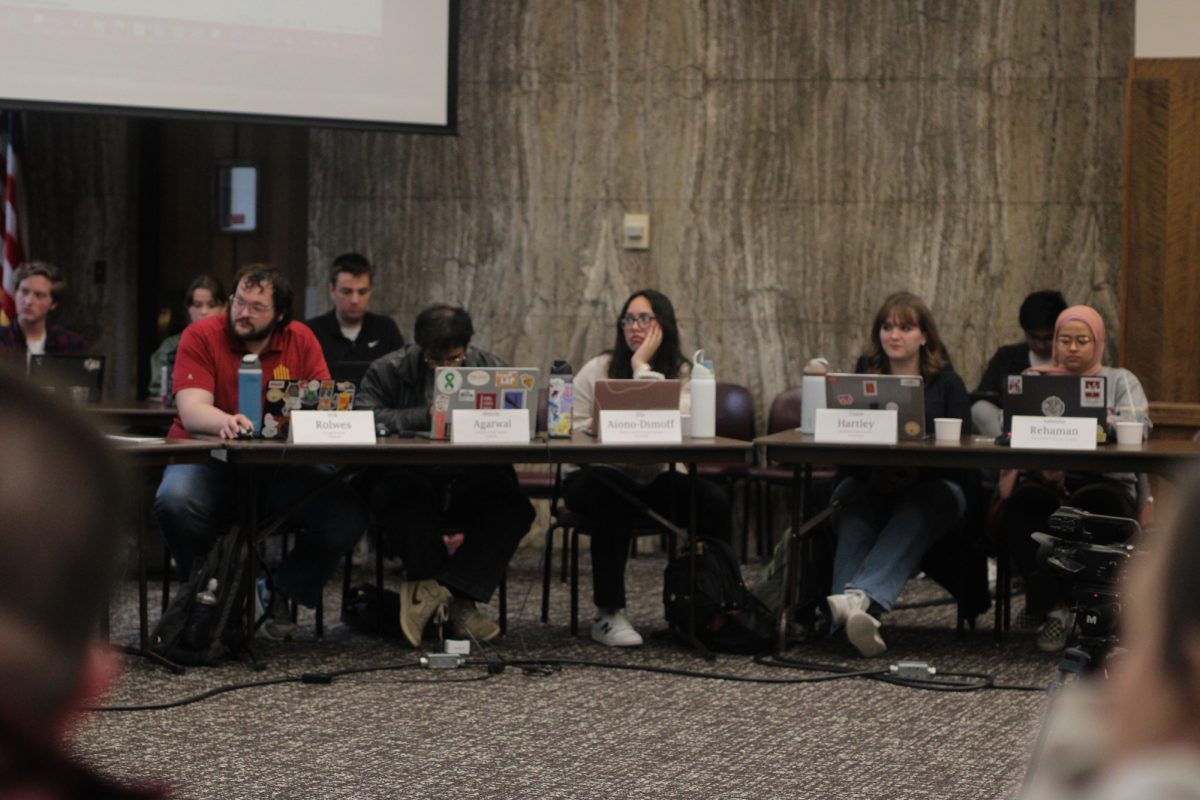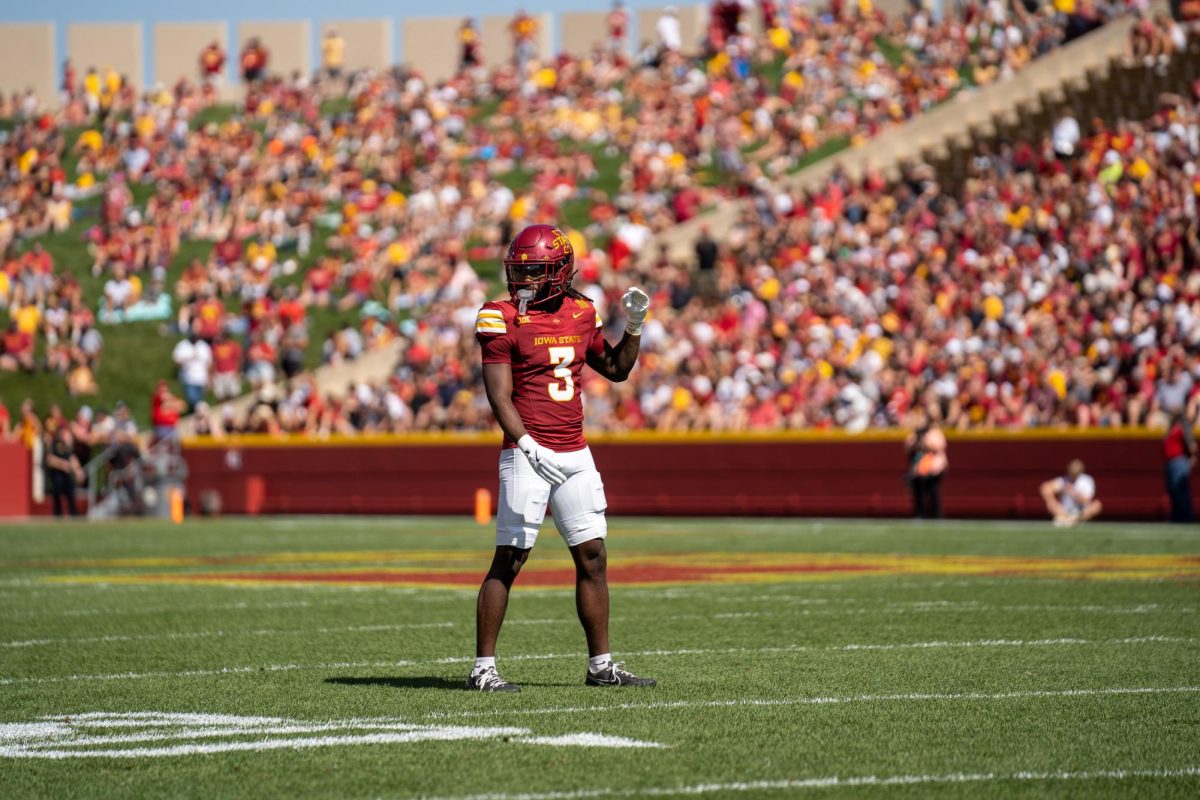Conversations with Steve Schainker
January 23, 2011
Q: For Campustown’s renovation, we had heard that it was maybe going to be considered that eminent domain be used to get properties so that renovation could go forward on Lincoln Way. Is that factual? Is eminent domain being considered?
Schainker: The next step how we thought it was going to be, they were going to come forward at the next council meeting, but I don’t think it will be until the end of February, beginning of March. LANE4 will come before the city, and I think, before they move on to their next step — which will be going from broad concepts into more detailed — they’re going to have to spend a lot of money to hire consultants. They want to enter into a memorandum of understanding with the city and the university to get some agreement on some broad concepts. So at that time, they’ll be proposing a memorandum of understanding that will, I think, try to lay out the incentives or what they need from the city and what they need from the university. So I think we’ll know at that time what their final position is or what their position is going to be.
I think in the interim, they’re trying to contact property owners and trying to negotiate the purchase of those properties, and they’re trying that to get some early estimates of what the construction costs will be. When you add the land costs and the construction costs, they’re going to have to determine how much they’re going to ask in the way of incentives from the city of Ames, so I think all those specifics will be clarified or brought up by LANE4 by the end of February I think — within a month.
Q: So what I understand is that LANE4 wants some reassurance that if they do go to the trouble of laying this out, when it’s all said and done they will be able to go ahead with it.
Well first of all, they tried to get substantial input from different parts of the community over the last nine or 10 months, maybe it’s been longer, and they’re putting together kind of a conceptual plan of the square footage, the kind of uses they’re going to have in their project, and to get into more detail, they’re going to have to hire some consulting firms and engineering firms. They’re going to have to create a lot more specificity in their construction costs, so they’re about to spend hundreds of thousands of dollars to get more detailed information on the project. So I think they don’t want to move ahead unless they know that the university or the city is willing to be a partner in the project. They’ll have to define what they expect of us in the way of, let’s say the city incentives. Because if the city is going to give no incentives at all, the project might not work financially for them, so why should they go ahead and spend the additional money for engineering firms and such if the council can’t help in the project?
Now, they’ll have to come forward and specify what they want from the city and the university and then both parties will have to say, “Well that’s too much, we can’t give that much.” It doesn’t mean because they asked for it, they’re going to get it. If it’s a partnership, I think they’re going to look for things the university can contribute, the city can contribute and of course, they have to be a partner in it and have a financial implication, a financial role in it too.
Q: OK, I’ve heard through the grapevine that some people are not very on board with the idea of selling their establishment or their property. And the properties that come to mind are, I think Mayhem is one of them that I’ve heard and I’m not quite sure who else, I haven’t actually hit the streets yet. So I guess if there are people that are obstructing what LANE4 wants to do, is the idea of appropriating that area through eminent domain or some other means like that within the bounds of what could happen? Or is that something that is completely out of bounds?
Well to do that it will take city council action, so that is something that is yet to be determined or even discussed. It is yet to be determined by the city council. It is premature to say what would happen. I think that’s the kind of dialogue that will take place in about a month.
Q: Is there any idea what will be on the agenda for the city council meeting, say, next Tuesday? Do you have any idea?
Nothing.
Q: Nothing about that whatsoever?
Right.
Q: Is there a hard date on when this will be talked about in the City Council?
No, I think the best projection is the end of February, which I think there is a Feb. 22 meeting or the first meeting in March.
[More discussion about the City Council meetings]
Q: Where exactly is this company from that is doing this?
They’re from Kansas City, Mo., and they’ve done projects I think in Manhattan, Kansas; Lawrence, Kan. and KU Med Center in Kansas City, Kan. So they’ve worked before in college towns or similar types of college-commercial areas like we’re talking about here in the Campustown area. That’s why they were selected I believe.
Q: That was my next question. Did they come to you or I guess they were selected …
The council put out an RFP with the president of the university expressing a willingness to partner with a developer to help redevelop the Campustown area. The goal was, and I want to make sure you understand this, was not to eliminate the student activity centers in Campustown. We know that it is a focal point for students. They didn’t want to eliminate that, what they want to do is add to it, to bring in a broader spectrum of customers to the area. So it would not be totally student-dominated in terms of the businesses that were there. They wanted to diversify its appeal but not to in any way eliminate the student activities and businesses there. They wanted to build upon it and make it a more diverse attraction for the community at large.
Q: I’ve got some plans in front of me from Sept. 28, that say block plan, Campustown, Ames, Iowa. Are those the most up-to-date plans?
I don’t think so. Well, I think most of the development is going to occur, at least in the first building phases, on both sides of Welch right by Lincoln Way and Welch and they’re only going to go a half-block south. So I don’t think they’re going to go in and eliminate businesses any further south. Do you know right where the Fighting Burrito is now? If you look at the alley into the parking lot there, if you look across from there and then look from that point to the north. That’s where they’re talking about. I don’t believe it affects all the projects up to Chamberlain. Now they may go up to Chamberlain in the next 10 years, but not in the initial project.
Q: We’ve talked a little bit about how some people will have to leave because physics majors tell me that two objects cannot occupy the same place. Is it just one of those things where you can’t make an omelet without cracking a few eggs? That if we’re going to put new things in, some of the old buildings will have to come down and I guess maybe some people will have to look to relocate?
Well that’s up to the developer. There’s the possibility that people can be brought into the project or you can see that they’re not affecting all the buildings in there. So you could build around certain buildings. I do know that change is difficult for people and what is being offered is something that dramatically changes the area and some people say that’s for good or bad.
Q: Well one of my fears is called gentrification and it’s not necessarily an intentional thing. But it’s where businesses come back to a run-down area of town and start fixing things up and relocates some people but then the surrounding rent goes up. So then maybe Mongolian Buffet which is just to the west may not be able to hang in there or India Star or Thai food… And also, from what I’ve heard, it seems like the things that would interest white people are going in there. If that happens, we’re going to have the minority business owners or places to eat, not be driven out, but through necessity of increasing rent they have to leave. So we push out what the free market established as a bunch of minority businesses that through whatever ended up in this small area. Once they take off, then it’s just things that white people enjoy.
Well, when we’re talking about a grocery store or a pharmacy, I can assure you that people of all races and colors can use that. I do understand what you’re saying about the impacts it may have not only on the people that own property, but the surrounding people. Does it affect them, making the value of their property go up? Is that a good thing or a bad thing if you own it? What if I told you that your house has gone up in value?
Q: That’s a good thing until my landlord tells me that my rent just went up.
That’s a good point. But the interesting thing is that if your property is worth more, maybe you pay more property taxes, right? But here’s the question for you, I can’t get into your sociological analysis of gentrification, but so what is the solution? What would you like to see happen there? That’s the question. Do we keep it the way it is? Is it developing the way you want, bringing in the right kind of businesses? That’s another legitimate position.
Q: My only goal is to have a conversation in the community about it and get that going. If Ames as a whole, the student population disagrees with it, then that’s the way it is.
You just want to have a dialog you’re saying? If you don’t like what’s being proposed here, what’s the other position? To accept what’s happening now and to say that that’s a perfectly fine environment and development that’s occurring there is correct, that the quality and the aesthetics is correct and you’ve concluded that no change is necessary, right?
Q: I guess in my mind as someone that believes in the free market and the freedom of the individual, and I have a great respect for small business owners, I don’t like seeing them uprooted. And if the intention is to fix something up, you don’t necessarily have to destroy something to fix it. I mean some of those businesses may be broken down, but my process is that instead of wiping out people that have been there for so long …
Now another thing to look at is that it predominately services students right now, and they tell me that 20 years ago there were men’s and women’s fashions that served all parts of the community. There were all sorts of attractions that people went to, not just students. So you could also say that that’s OK, it should be student centered and we shouldn’t change that. Or we should try to do something to attract other type of activities that would bring a more diverse group into the area. I’m just asking the question, I’m not drawing any conclusions either.
Q: If they were here, doesn’t that say that because there were so many students, the market itself allowed those things to perish and move away?
Good point. We’d have to find out why they moved out wouldn’t we? The fact is they may not be there now, and I think it’s the vision of the council and the president of the university to try to diversify the attractiveness of that area. To add to it, not to detract from student activities, but to add to it so by doing this it may be even more financially viable for the people who are there. So they may have a more diverse customer base on which to survive. Hopefully not to hurt the student activity.
Q: But part of the plans do include turning the Ames Progressive into a parking lot I think. It’s where they have independent concerts, I believe they have a salon in there, it’s mostly known as a music venue in front of the Ark. The Ark will probably have to take a hike as well, which is unfortunate because I buy pet stuff there. I guess we’re just talking about the winds of change and whether people are going to like it or not in essence.
I can tell you that one of the top six priorities of the city council was to rejuvenate Campustown, to redevelop Campustown. That’s how we got into the project. Interesting enough, it appeared to be an important goal of the ISU administration too. So it was nice when we both came together with the same kind of goal and are working together on this project. Now people may disagree on what that means, what is the definition of revitalize, rejuvenate or redevelop. And that’s maybe where the dialog is going.
Q: Is there any plans for the Planet Sub that closed down not but a block and a half east from Lincoln and Welch? And the Taco Bell closed down about two blocks to the west on Lincoln Way…
So do you think that’s good? No, right? So what do you do? Do you see that there is a trend that we should allow to continue? Or do we find out what’s happening and try to reverse the trend? Or do you think it’s the result of anything?
Q: You’re asking a lot from someone that just wanted to ask you a few questions. I guess in my mind I would hope that the answer would include revamping the property with the most political capital because of its location. I’d think [the project] would also include the stuff that is also struggling a little bit but isn’t that far away and could be a definite draw if there were just things there. Like that Taco Bell has a big parking lot. It also has another building adjacent to it. I don’t know what that is. I don’t see anything but graffiti when I walk by. I guess there’s a lot of discussion to be had anyway. But like I said, I heard through the grapevine that eminent domain was going to be discussed at some point or at least was in the thought process. But you’re saying that it won’t be happening until the end of February?
Yeah, I think what you probably heard and we thought this would happen too was that we’d be taking this to the city council on Jan. 25, which is next Tuesday, but I think we’re delaying it somewhat. I think the university is in separate discussions with the developer, and I think that they’ve asked for some more time. So I don’t think that these issues will be brought before the council until the end of February.
Q: Well, I appreciate you talking to me.
Sorry I wasn’t more helpful. But the good thing about it is that whatever happens, it’s going to be done in a public session. The discussion of all these topics, the magnitude of the incentives, what type of incentives… And I use incentives. Eminent domain could be considered as an incentive, there are dollar incentives and there are other incentives. Whatever the developer thinks is warranted to complete the project; they’ll be asking the university and the city for in this memorandum of understanding. So it will come before the council.






